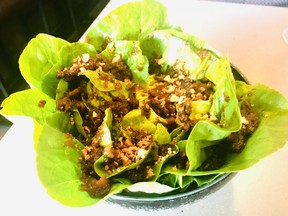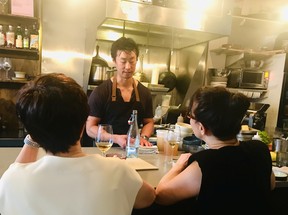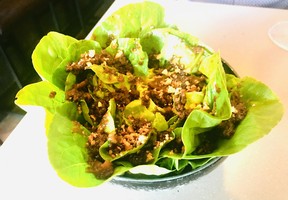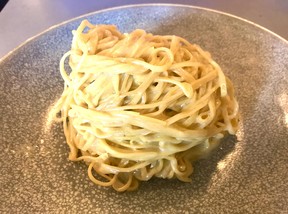Reviews and recommendations are unbiased and products are independently selected. Postmedia may earn an affiliate commission from purchases made through links on this page.
Elephant’s not edgy or weird. Just honest, delicious food.


Article content
Elephant
Where: 1879 Powell St., Vancouver
Advertisement 2
Article content
Article content
When: Dinner, Friday to Monday
Info: 604-895-4233. elephantinvancouver.com
The pandemic might have altered business strategies for some seasoned restaurant operators. One involves spaghetti.
Miki Ellis and Stephen Whiteside, operators of Dachi and the late Ugly Dumpling, two busy Eastside restaurants, went with their gut rather than consider business plans when Ugly Dumpling business partner and chef Darren Gee moved to Japan.
“We threw a lot of spaghetti at the wall to see what stuck,” Ellis says of the Ugly Dumpling space.
Soon, it became Hanai, a Hawaiian-influenced spot, which I’ll be writing about down the road.
“It’s been such a surprise. It wasn’t something planned. We learned these muscles through the pandemic. It changed our idea of operating a business in challenging Vancouver. It really opened my eyes to thinking differently and saying yes to everything,” she says of the months of pivots and thinking outside the box.
Advertisement 3
Article content
Rather than safe-than-sorry, they opt for yes because it was something positive for the community.

Elephant restaurant is another piece of spaghetti noodle that stuck. Just as the free-spirited chef Justin Ell (previously Lee), suggested a restaurant partnership, the former Trans Am space came up. The stars aligned and Elephant opened in December.
Ell is an outside-the-box kind of guy. His last job at Miantiao at the Shangri-La Hotel, which required a big team, was not where he’s at his best.
His talent is unleashed when he’s on his own in a small kitchen, completely in control, making very tricky moves that result in smooth, delicious, umami-filled dishes. When described on the menu, they might even turn some diners off. That’s why his descriptions are sometimes cryptic.
Advertisement 4
Article content
The dishes at Elephant, I think, are more consistently delicious and eye-catching than at Miantiao.
He’s not so much ingredient-driven as farmer-driven, purchasing what the farmers he works with can’t move and creating unconventional dishes.
“Sure I want what’s at peak, but I’ll do my best to help out. If kale isn’t cool anymore and they have it sitting and going to waste, I’ll buy it. Farming’s getting harder and harder and it’s a real uphill battle,” he says.
Recently, one of his farmers had chicory root that wasn’t selling. Ell bought it up and made ice cream. People think it’s coffee ice cream.
“A lot of people ask if I’m sure there’s no Vietnamese coffee in it.”
Kudos to him, I say — he’s prodding consumers to open minds and embrace the unusual.
Advertisement 5
Article content
“I’m hoping people eat what I cook and think it’s not weird or experimental, but just tasty,” he says. “That’s kinda what Kelcie (Jones, the wine expert) and I both try to do — share things that are unusual but good for the planet, good for ourselves and our health.”
The Elephant iteration of his cooking has a delicacy, albeit amped up with umami. Delicacy isn’t what you’d expect of a chef who deadlifts 600 pounds and squat lifts 550 pounds.
“Any 13 or 14-year-old can put me in my place,” he downplays.
On the current menu there’s an addictive cloudy daikon soup — it’s the opposite of cloudy actually and more like a burst of sunshine. Ell had daikon from Crescent Island Farms in Delta and found them to be buttery and creamy rather than sharp and crisp.
Advertisement 6
Article content
“I showcase its butteriness,” he says.
He caramelizes the daikon slices, adds whatever stock he has, simmers until it completely breaks down and adds aged mushroom seasoning.
“I don’t have to purée it or pass it through a chinois. It’s just so creamy. People ask if there’s cream in it, but it’s just the quality of the vegetable.”

There’s a cryptic dish called Lettuces, with cashew and warm spot prawn and sablefish offal XO. He makes the XO from the meat of spot prawn heads — again buying up something a fisher friend had on hand and adding sablefish hearts he had saved up. Once cured and braised, the sablefish hearts are similar in taste to scallops, and the spot prawn head innards are “pure deliciousness,” he says.
This labour-intensive XO sauce slightly cooks the lettuce and brings out the vegetal notes.
Advertisement 7
Article content
“It’s honest cooking,” he says. “Western cuisine is so detached from food in general. I try not to be edgy or weird or cool. I just want to cook honest food.”
The XO sauce creates a yummy umami in the folds and crevices of sweet and buttery salanova lettuce.
Another unique and lovely dish was Aged Rice, with Taleggio cheese, turnip and peanuts. The al dente rice grains are fluffed, light and separated. It’s washed several times to make that happen and then it’s very lightly flavoured with the cheese and strewn with turnips and crushed peanuts. I’ll take this over risotto any day.

The Quantum beef in the tajarin, a Piedmontese ribbon pasta, is definitely a disguise. He changed it up from a dish on his menu at Miantiao. There, the ‘quantum’ beef was cured beef heart, dried enough to shave onto the pasta. At Elephant, the beef heart is made into something like garum, the ancient Roman fish sauce.
Advertisement 8
Article content
“Instead of fish, I use beef heart like liquid beef seasoning. Piedmont is known for high quality beef, so I wanted to honour the quality of the ingredient without straying too far.”
To make the liquid, he dries and cures the beef heart as the Japanese do with skipjack tuna to make bonito flakes.
For dessert, we shared a sizable slab of Frozen Thai Ice Tea — somewhat like a semifreddo except Ell uses whipped egg whites and milk instead of cream and whole eggs. This dish didn’t excite me. It was bland and thanks to its tea hue, it looked to me like a slab of raw foie gras.
You can order à la carte — dishes on the menu range from $8 to $30 — or omakase, which is $68 with five to 10 dishes, depending on what Ell’s serving.
“In my mind, that’s kind of crazy value,” he says. “You’re getting the best-quality products. I want our industry friends to come in and hang out without busting their wallets.”
Advertisement 9
Article content
The menu changes regularly to keep things “fun and exciting for the regulars who come in at least once a week,” he says.
Omakase meals must be booked in advance with a $10 deposit. Only groups of four or less per table can be accommodated. And that brings me to the name of this cosy restaurant. It’s a small 18-seater of just over 525 square feet. Elephant is totally tongue in cheek.
Jones’ beverage program focuses on wine and, specifically, wines “based on their radical approaches to regenerative farming, deliciousness and suitability to Justin’s bright flavours and precise cooking.”
“I always talk about wines in terms of their production and farming practices and use small importers who know their producers,” she says. “It’s the big piece I always ask about.”
Advertisement 10
Article content
The list roams the world but leans toward choices from Italy and the French regions of Burgundy, Alsace and the Loire. There’s a good selection of sparkling wines and a few bottles of sake. It’s a substantial list for such a small restaurant. The omakase menu is available with five wine pairings for $58 and there’s a rotating selection of wines by the glass.
Jones recommends Buronfosse cremant du Jura Brut to go with Ell’s savoury, fermented dishes, the traditional method bringing out toasty, briochy, yeasty notes. For a white, she suggests Benanti Etna from volcanic soils and its “lovely mineral quality with fruitiness that works with spicier dishes.”
And for a red, La Gross Pierre Chiroubles Gamay for its super-elegant, fresh expression of Gamay — a perfect, juicy, summer red.
miastainsby@gmail.com
Source: vancouversun.com


